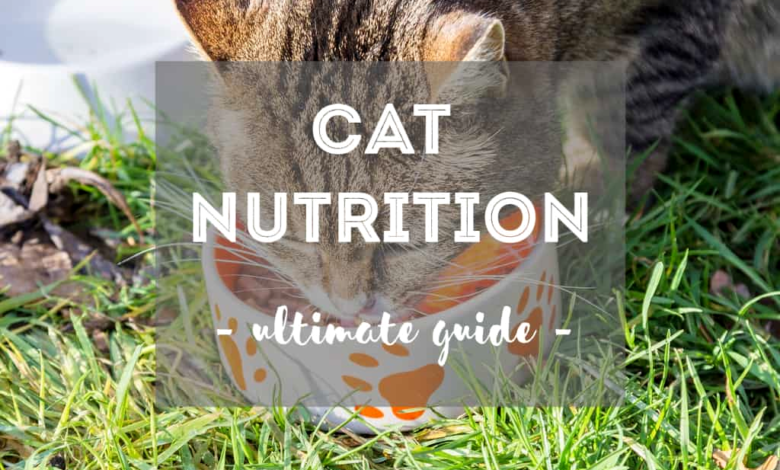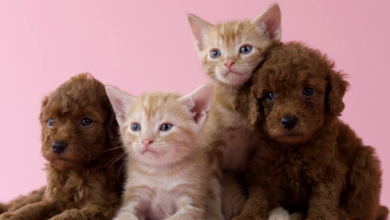
The Ultimate Cat Nutrition Guide: Everything You Need to Know
As a cat owner, ensuring the optimal health and well-being of your feline companion is of utmost importance. One key aspect of their overall health is nutrition. A well-balanced diet is essential for cats to thrive and maintain their vitality. In this ultimate cat nutrition guide, we will delve into the world of feline nutrition and provide you with all the information you need to make informed decisions about your cat’s diet.
Read More: Top 7 Ideas For How to Keep Your Cat Entertained
Understanding a Cat’s Nutritional Needs
Cats are obligate carnivores, which means their bodies have evolved to require specific nutrients found primarily in animal tissues. Unlike humans and other animals, they have a higher demand for certain nutrients like proteins and fats. Understanding their unique nutritional needs is crucial to meet their dietary requirements adequately.
Essential Nutrients for Cats
Proteins
Proteins are the building blocks of a cat’s body. They are necessary for growth, development, and maintaining healthy muscles. Animal-based proteins, such as those derived from poultry, fish, and meat, are highly digestible and provide the essential amino acids that cats need.
Fats
Fats are a concentrated source of energy for cats and play a vital role in maintaining healthy skin and coats. Omega-3 and Omega-6 fatty acids are particularly beneficial for cats’ overall well-being. Fish oil and certain plant oils are excellent sources of these essential fatty acids.
Carbohydrates
While cats have a limited ability to digest carbohydrates, they are not considered a necessary component of their diet. Cats derive most of their energy from proteins and fats. However, a small amount of easily digestible carbohydrates can be included in their diet.
Vitamins and Minerals
Vitamins and minerals are essential for various physiological functions in a cat’s body. They contribute to the immune system, bone health, and overall vitality. A well-formulated cat food should contain adequate amounts of these micronutrients to support optimal health.
Water
Water is often overlooked but is crucial for maintaining a cat’s hydration and supporting vital organ functions. Cats have a low thirst drive, so it is important to provide fresh water at all times and consider incorporating wet food into their diet.
Choosing the Right Cat Food

Selecting the right cat food is paramount to ensure your feline friend receives a balanced and nutritious diet. Consider the following factors when making your choice:
Reading the Label
When evaluating cat food options, carefully read the labels. Look for high-quality protein sources as the primary ingredient, minimal fillers, and a proper balance of essential nutrients.
Wet Food vs. Dry Food
Both wet and dry cat foods have their pros and cons. Wet food provides additional hydration and can be beneficial for cats with urinary tract issues. Dry food is convenient and can contribute to dental health. Combining both types may offer the benefits of each.
Commercial vs. Homemade Diets
Commercial cat foods are formulated to meet a cat’s nutritional needs. Homemade diets require careful planning and consultation with a veterinarian or feline nutritionist to ensure they provide all the necessary nutrients. Always seek professional guidance if considering a homemade diet.
Feeding Guidelines for Cats
Establishing proper feeding guidelines is essential to prevent overfeeding or underfeeding your cat.
Portion Control
Follow the recommended portion sizes based on your cat’s age, weight, and activity level. Adjust the portions as needed to maintain a healthy body condition.
Feeding Frequency
Most adult cats benefit from two meals a day. Kittens and pregnant or nursing cats may require more frequent feeding. Consult with your veterinarian for specific recommendations based on your cat’s individual needs.
Treats and Snacks
Treats and snacks should be given in moderation and accounted for in your cat’s overall daily calorie intake. Choose healthy options specifically formulated for cats.
Common Dietary Issues in Cats
Several dietary issues can affect cats’ health and well-being. Understanding these issues can help you address them effectively.
Food Allergies and Intolerances
Some cats may develop allergies or intolerances to certain ingredients. Common allergens include grains, dairy, and specific proteins. If you suspect a food allergy, consult with your veterinarian to determine the best course of action.
Obesity
Obesity is a common problem in cats and can lead to various health issues. Monitor your cat’s weight and body condition regularly, and adjust their diet and feeding habits as needed to maintain a healthy weight.
Urinary Tract Health
Certain dietary factors, such as water intake and mineral balance, can impact a cat’s urinary tract health. Consult with your veterinarian to ensure your cat’s diet supports a healthy urinary system.
Dental Health

Dental problems are prevalent in cats. Feeding a diet that includes dental health benefits, such as kibble designed to promote oral hygiene, can be beneficial. Regular veterinary dental check-ups are also important.
Special Dietary Considerations
Different life stages and health conditions may require specific dietary considerations for cats.
Kittens
Kittens have unique nutritional needs for growth and development. Choose a high-quality kitten food formulated to support their rapid growth and provide essential nutrients.
Senior Cats
Senior cats may benefit from diets tailored to their specific age-related needs. These diets often include joint support and lower-calorie formulas to help maintain a healthy weight.
Pregnant and Nursing Cats
Pregnant and nursing cats require increased nutrition to support themselves and their offspring. Consult with your veterinarian to ensure they receive an appropriate diet during this time.
Cats with Health Conditions
Cats with specific health conditions, such as kidney disease or diabetes, may require specialized diets. Work closely with your veterinarian to develop a dietary plan that addresses their unique needs.
Transitioning to a New Diet
When introducing a new diet to your cat, do so gradually to avoid digestive upset. Gradually mix increasing amounts of the new food with the old food over a period of 7-10 days until the transition is complete.
Signs of a Well-Nourished Cat
A well-nourished cat exhibits signs of good health, including a glossy coat, clear eyes, healthy weight, and good energy levels. Regular veterinary check-ups can help ensure your cat is thriving nutritionally.
Read More: What are some common cat illnesses & symptoms?
FAQs (Frequently Asked Questions)
- How often should I feed my cat? Most adult cats benefit from two meals a day. Consult with your veterinarian for specific recommendations.
- Can I feed my cat a vegetarian or vegan diet? Cats are obligate carnivores and require nutrients found primarily in animal tissues. It is not recommended to feed them a vegetarian or vegan diet.
- Should I give my cat supplements? In general, a portion of well-balanced cat food should provide all the necessary nutrients. However, consult with your veterinarian if you have concerns or specific dietary requirements.
- Can I feed my cat the same food I eat? Human food is not formulated to meet a cat’s nutritional needs. It is best to feed them a diet specifically designed for cats.
- How can I help my cat maintain a healthy weight? Portion control, regular exercise, and feeding a balanced diet is key to maintaining a healthy weight in cats.
Conclusion
Providing your cat with a nutritionally balanced diet is essential for their overall well-being. By understanding their unique nutritional needs, choosing the right cat food, and addressing specific dietary considerations, you can help your feline companion lead a healthy and happy life.







